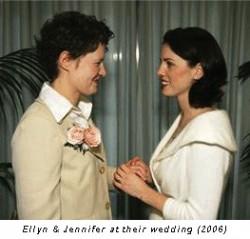
In our 2001 case on behalf of Sharon Smith, the horror was unmatched. Sharon’s partner of seven years, Diane Alexis Whipple, was killed by massive dogs while trying to unlock the door of her San Francisco apartment. Her mauling, the grace and legal vulnerability of Sharon, and the stunning callousness of the dog owners captured headlines around the world, and illustrated a fact unknown to most people: couples in same-sex relationships routinely have our relationships ignored and disregarded by the law.
While Sharon was in the midst of unimaginable grieving, the State of California told her that because she and Alexis were not married, she had no right to hold the dog owners responsible for Alexis’s death. Insult compounded terrifying injury. NCLR represented Sharon in her wrongful death action, and the court ruled that she must be treated as a surviving spouse—a historic victory. But no victory, however historic, could erase either the loss or the added pain of having to fight so hard simply to be recognized as a loving, grieving partner.
Now, 10 years later, we represent Jennifer Tobits. Last September, Jennifer’s wife, Sarah Ellyn Farley, an accomplished and beloved lawyer and friend, died of a rare and aggressive form of cancer. Just four years earlier, the couple had married in Canada. Like Sharon, Jennifer now finds herself having to both grieve the loss of her loving spouse and fight to have their marriage respected and recognized. In this case, however, the insult of invisibility and denial is perpetuated not by the state, but by Ellyn’s own parents.
Ellyn’s parents never accepted their daughter for who she was, and her relationship with them had many ups and downs. They refused to attend Ellyn and Jennifer’s wedding celebration, instructing Ellyn to keep the celebration secret from other family members as well. As an adult, Ellyn’s body still bore visible scars from her father’s beatings of her with a belt—those beatings happened in Ellyn’s adolescence, a time when she was just beginning to express her identity. After she left for college, Ellyn built her life halfway across the country. Although she maintained contact with her parents, she kept them at arms’ length even while she was struggling with cancer. And as her illness grew worse, Ellyn began to fear that her parents would make things hard for Jennifer after she died. In an attempt to pacify her parents, and to protect Jennifer from the bullying Ellyn knew to expect, Ellyn made her parents the beneficiaries of her life insurance policy, worth almost half a million dollars. It turns out Ellyn was correct that her parents would make things difficult, and sadly wrong that they would be mollified by the insurance proceeds.
When Ellyn was hospitalized last September, and clearly in her final days, Jennifer contacted Ellyn’s parents over Ellyn’s objections. From the moment Ellyn’s parents showed up at the hospital, their bullying and intimidation were relentless. While Ellyn lay in her hospital bed, weak and close to death, her father repeatedly asked to see her will. He insisted that he and Ellyn’s mother take the bed in Ellyn’s room and told Jennifer she could have a chair “for the time being.” Ellyn’s parents also attempted to usurp Jennifer’s role as Ellyn’s medical decision maker, even though Ellyn had designated Jennifer to make all decisions for her, and even though Jennifer and Ellyn had been fighting Ellyn’s cancer together for four years. But perhaps most shocking, Ellyn’s father, during a time when she had been vomiting blood, pressured her to sign a form naming himself and Ellyn’s mother as the beneficiaries of the profit sharing plan at Ellyn’s law firm. Ellyn was literally in the last hours of her life—she died fewer than 15 hours later.
It is appalling and unbelievable that parents could behave so callously while their child literally lay dying before their eyes. It is painful and infuriating that Ellyn had to spend her last days under the manipulative and intimidating influence of her parents. And this tragedy is compounded by the sad reality that Ellyn’s parents didn’t use the last days of her life to come to peace and to reconcile their difficult past. They instead re-victimized her and bullied everyone around her.
In the months since Ellyn’s death, Jennifer has been grieving—and against her desires, fighting for what she knows Ellyn wanted her to have. Over the last eleven months, Ellyn’s parents have tried to assert control over everything Ellyn owned. They have tried to leverage the threat of a prolonged, expensive fight to make Jennifer give up as much as they can get, including the nearly $43,000 in Ellyn’s profit-sharing account that Jennifer is entitled to as Ellyn’s spouse. We, along with our co-counsel, Benjamin L. Jerner and Tiffany Palmer of Jerner & Palmer, P.C., Teresa Renaker and Julie Wilensky of Lewis, Feinberg, Lee, Renaker and Jackson, P.C., and Dan Ebner and Ray Prather of Prather Ebner LLP, will fight for Ellyn’s wishes. We will ensure that her marriage to Jennifer is legally recognized, despite the ongoing and insulting efforts of Ellyn’s parents and their lawyers, the far-right and extremely anti-gay Thomas More Society, who in a recent press release referred to Jennifer as a “leech.” This level of disrespect is beyond what any grieving spouse should have to endure.
We know we can’t ease Jennifer’s loss. We can’t bring Ellyn back. But we can fight for their love, and for the respect their relationship deserves. We can fight for Ellyn’s wishes. We can fight for our basic dignity and decency. We will continue to fight these battles for as long as it takes until the loss of a partner, wife, or husband is seen, felt, and honored equally, no matter what.
Yours,

